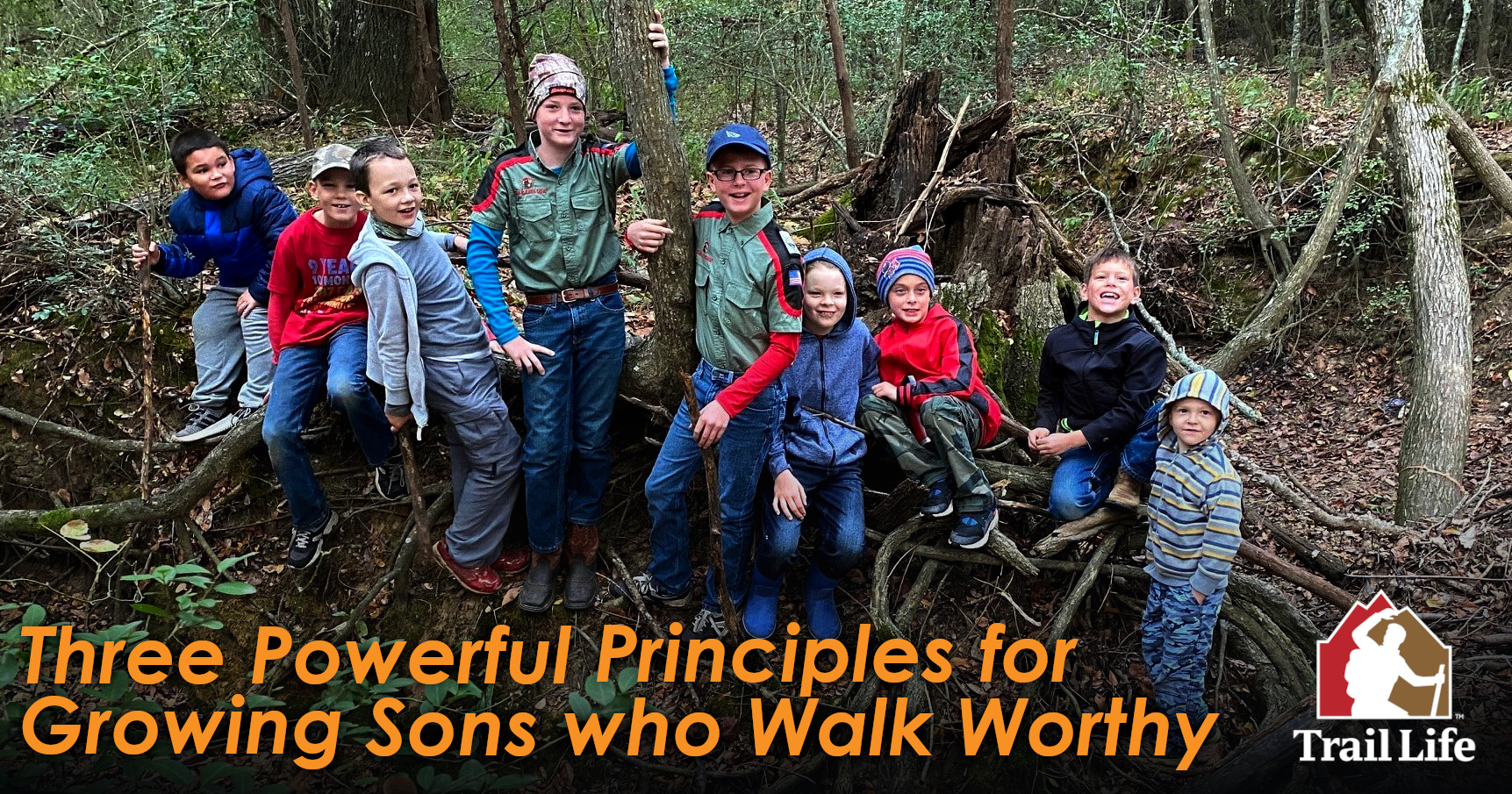Growing Sons Who Walk Worthy
For this reason we also, since the day we heard it, do not cease to pray for you, and to ask that you may be filled with the knowledge of His will in all wisdom and spiritual understanding; that you may walk worthy of the Lord, fully pleasing Him, being fruitful in every good work and increasing in the knowledge of God;”
Colossians 1:9-10
Immersed in a culture that has declared masculinity to be "toxic" and bombarded by media portraying men as foolish and impulsive. Is it any wonder that boys are confused about what it means to be a man? Colossians chapter 1 outlines three powerful principles from creation to effectively grow sons who are "fruitful in every good work" and who "Walk Worthy!"
1. Fruit is Grown Through Patient Seasons of Repetition
For fruit to be produced, endless cycles of repetition must occur. Each day the sun shines forth and every night the moon takes its place. Every year the sun warms the air, rain falls, and sap rises from the ground painting the forest with the glorious colors of spring. Then the air cools and the sap descends to prepare for a long winter rest, again setting the forest ablaze with color. It seems this repetition is the joy of creation. Similarly, in our lives, there are many seasons of repetition as we, "grow in the knowledge of his will in all wisdom, and spiritual understanding (Col 1:9)."
The Trail Life program equips leaders to effectively use repetition to impart knowledge, understanding, and wisdom to boys in the Troop. The Woodlands Trail program focuses for six years on the same basic principles to provide the roots of knowledge. The Navigators program builds on these roots of foundational knowledge to create a strong trunk of understanding (the application of knowledge). The Adventurers program culminates in developing wisdom (applying understanding) to develop men who bear fruit as godly and responsible husbands, fathers, and citizens.
Application Point: Parents often feel like they never stop repeating themselves. It can be helpful to realize that routine and repetition are effective tools to grow knowledge, understanding, and wisdom. Be intentional with your repetition. It may be as simple as intentional discussions on car rides, setting up chore schedules, spending time memorizing scripture daily, or creating time each evening to gather as a family and talk about the day. Look for opportunities to create meaningful repetition to impart important truths to your children.
2. Watered through Prayer
As water is essential to growth and bearing of fruit in plants, prayer is essential to growth and bearing of spiritual fruit in boys. In verse 9 Paul writes, “for this reason we…do not cease to pray for you.” Paul understood the necessity of prayer and spoke particurarly of the need for men to pray. In 1 Tim 2:8 the Apostle Paul writes, "I desire that in every place the men should pray." in 1 Peter 3:7, he says that men should honor their wives so that their prayers may not be hindered." Prayer is an essential aspect of godly masculinity.
Paul implores the Romans to, "strive together with me in your prayers to God on my behalf. (Rom 15:30). Jacob wrestles with God and prevails. "During the days of Jesus life on earth, he offered up prayers and petitions with ferverent cries and tears" (Heb 5:7). The Bible is filled with praying men. Men like Abraham, Elijah, Moses, Daniel, Gideon, David, Samuel, Hezekiah, Shadrach, Meshach, and Abednigo. Men who "stopped the mouths of lions, quenched the power of fire, escaped the edge of the sword, were made strong in weakness, (and) became mighty in war" (Heb 11:33-34). In Ephesians 6, Paul urges men to put on the armor of God, and "pray at all times in the Spirit in every season...watching with all perserverance and supplication" (Eph 6:18). "The effectual ferverant prayer of a righteous man availeth much" (James 5:16).
In Colossians 1 Paul describes the power of effectual feverant prayer to incubate faith and grow fruit. Paul paints a picture of the sapling of faith and love springing from the seed of hope through the gospel (1:5). By prayer, the seedling is watered (filled) with knowledge, understanding, and wisdom (1:9). This healthy root system grows and is strengthened, bearing fruit of joy, steadfastness, thankfulness, and patience (1:10) and yielding a walk that is worthy. A walk that bears fruit that is fully pleasing to the Lord and shows that we have been delivered from the power of darkness and transferred to the kingdom of the Son, redeemed and forgiven (1:12-13).
Boys need role models who pray and who - through prayer - water the sapling of faith in their lives. To become men who bear fruit and "Walk Worthy", boys need to hear stories of answered prayer from men in their lives and experience answered prayer as they pray. Prayer is a cornerstone of the Trail Life ministry. Trail Life meetings open and close with prayer and provide opportunities both for boys to pray and for boys to hear the hearts of their leaders as they pray over the Troop. Adventure trips and Troop campouts also provide meaningful times for boys to pray and see God provide practical needs.
Application Point: How can you create time each day to intentionally pray with and for your children? It does not have to be necessarily long or involved. Make time each day to let your children hear your heart and see your faith. It can begin as simply as creating a list of one or two items to pray for each day of the week.
3. Strengthened through Experience
This leads us to the third principle: experience. Just as in creation, real leaves must fall for fruit to be born. In boyhood, lessons must go beyond mental understanding to applied experience before they are truly learned and fruit is borne. Often these lessons are most clearly taught in the physical realm of God’s creation. In the outdoors, where we have to deal with physical realities, we learn to live with our answers. If a boy pitches a tent incorrectly, he gets wet. If he ties a fisherman’s knot incorrectly, he goes hungry. If his feet get wet in the winter, he gets cold. Forgetting to soap a pot before cooking over a fire is not a lesson quickly forgotten. Boys live with their mistakes, but they also learn the feeling of doing a job right. The feeling of staying dry in a storm, catching a fish, or starting a one-match fire.
Moral truths and life lessons are taught most clearly in the physical realm. Isaiah 32:17 says, "the fruit of righteousness is peace." As peace is experienced through rightness and experience, boys come to understand the value of something being right, and begin to experience the "peace that passes understanding (Php 4:6)." In Trail Life, as boys apply spiritual truths learned throughout the program, they have the opportunity to test and see that they are true. As boys see their value, biblical truths become part of their character and boys grow in knowledge, spiritual understanding, and wisdom becoming “fruitful in every good work” (Col 1:10).
Application Point: Look for opportunities to help your son make connections between practical realities and biblical truths. The Bible is an incredibly practical book. Find a time to connect with your son at least weekly and during that time help him connect successes in his life with biblical principles. Help him to see the joy and success that is borne from applying the truths of scripture in a growing relationship with the living God.



